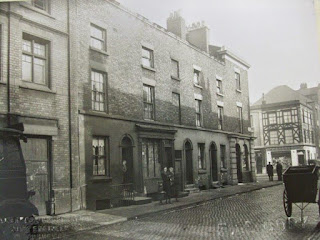In 1881 Everton man Joseph McEntee was hanged for killing his wife, whose body was found by fellow tenants whilst he went on the run.
Joseph, who worked as a tailor, lived with his wife Ellen (aged 50) in a three storey house at 89 Rose Place, occupying the parlour and top storey. Another family named the Penningtons rented the first floor.
On the morning of 5th April 1881 one of the Pennington children, a little girl came downstairs and found a blood soaked rag on the floor and noticed that the parlour door handle was missing. She then looked through the keyhole and saw the corpse of Ellen, but was told off by her mother for being nosey. However when Martha Pennington went down herself she looked and could only see the prisoner, but when he went out she opened the door using a stick and found the battered body of Ellen.
The police and a doctor were called, who ascertained that there were five stab wounds on the body and that the death had probably occurred the night before. A niece of Ellen came forward to say that she had called to see her at 10pm and Joseph had been evasive as to her whereabouts, and had appeared to step over something as he answered the door.
A description of Joseph was circulated around police stations and he was arrested that night in Garston in a drunken state, having pawned a watch there for 30 shillings. Although he had had his moustache and beard shaved off a police constable noticed the blood on his hands and boots, which were matted with hair. When he was searched he was found to have a door knob in his pocket and was reported to have said 'its all through drink' as he was arrested.
At his trial on 10th May, witnesses acknowledged that although the couple were known to drink heavily, they were not renowned for quarrelling and that Joseph had always provided well for Ellen. His defence counsel claimed that he had returned home to find Ellen murdered and been so bewildered that he just wandered about drinking in an aimless manner. In his summing up, Mr Justice Mathew stated that the defence had acknowledged that a murder had taken place and it was simply up to the jury to decide if the circumstantial evidence pointed to Joseph as the killer. After retiring for 20 minutes they returned a verdict of guilty.
When asked if he had anything to say, Joseph replied 'Its no use now I have been found guilty.' After being sentenced to death Joseph shook hands with his counsel and was taken down to the cells. Although his solicitors tried for a reprieve on the grounds that Joseph had no murderous intent this was refused. He was hanged at Kirkdale Gaol on 31st May, a crowd of several hundred gathering outside the walls. The thud of the 'drop' was clearly heard outside and one woman in the crowd wept bitterly, saying she had known him since he was a boy and he hadn't meant it.














